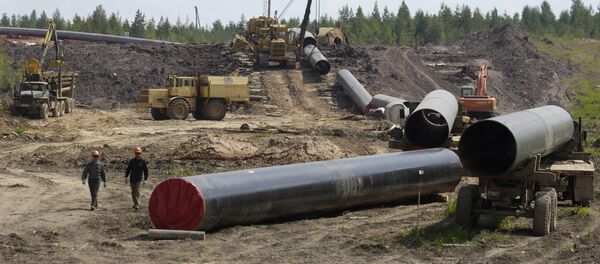Kristian Rouz — The world’s largest sovereign wealth fund put forth a proposal to exclude oil and natural gas stocks from its benchmark index, meaning it’s considering decreasing its investment in energy companies.
Norway’s central bank, which manages the Government Pension Fund Global (GPFG), says such a move would allow the lowering of the fund’s exposure to oil price fluctuations.
Oslo Optimistic Over Record Gas Exports Amid Europe's Rising Appetite
This, in turn, would make Norway’s pension and welfare benefit system more sustainable in the increasingly volatile oil price environment.
"The return on oil and gas stocks has been significantly lower than in the broad equity market in periods of falling oil prices," the central bank’s statement read. "Therefore, it is the Bank's assessment that the government's wealth can be made less vulnerable to a permanent drop in oil prices if the GPFG is not invested in oil and gas stocks."
North Sea drilling and offshore production are becoming increasingly expensive, and as oil prices are facing persistent downward pressure due to the aftereffects of the shale revolution in North America, Scandinavian public and private sector companies seeking to divest from oil extraction.
"Our advice is to simply remove the oil and gas sector, as it is defined in the FTSE reference index, from the fund's reference index," Norway’s Deputy Central Bank Governor Egil Matsen said. "That would mean all companies that the FTSE has classified with the sector, should be removed from our reference index."
The proposal is now subject to parliamentary review. Oil and gas stocks represent roughly 6 percent of the nation’s wealth fund, or $37 bln. This is not a significant degree of exposure, and even a gradual sell-off of this amount of energy stocks is unlikely to send shockwaves across the European, let alone global, energy industry.
However, the proposal resulted in a 0.27-percent drop in Europe’s index of oil and gas equities.
If the Norwegian parliament adopts the proposal, the shares will likely be acquired by the European oil giants, such as the aforementioned Total, Royal Dutch Shell, or BP. This, in turn, would allow for a greater consolidation of capital and investment in the hands of energy corporations, which would contribute to their sustainability.
However, other wealth funds and institutional investors might follow the lead of Norway’s sovereign wealth fund.
"The risk for the oil sector is how many investment funds will downsize their exposure to extractive industries," Jason Kenney of the Spanish lender Santander said.
At the same time, Royal Dutch Shell is the fund’s third-largest investment, worth over $5.3 bln, and exceeded by the fund’s stakes in Apple and Nestle. This means a decision to divest from oil would result in other wealth funds’ reassessment of their portfolios.
Some believe Norway’s decision to lower GPFG’s exposure to oil market dynamics could produce a tectonic shift in the perception of the energy sector amongst global investors.
"This is an enormous change. It’s a shot heard around the world," Mindy Lubber of investment non-profit Ceres said.
However, even though global energy prices are currently much lower than a decade ago, the demand for fossil fuels remains rife. Thus, as the US and the UK are experiencing a resurgence in domestic manufacturing, and global economic growth gains momentum, all indicating that global oil extraction is far from standing on the brink of panic divestment.
After all, oil and gas stocks might have a better longer-term future than many other types of equities. Energy sector shares are rooted in commodity prices, which historically have demonstrated less severe boom-bust cycles than higher-returning types of investment.




